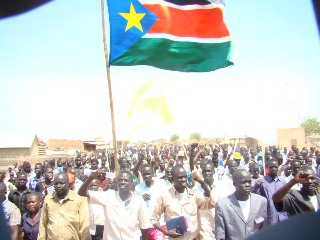South Sudanese advocacy groups back US sanctions
May 5, 2014 (JUBA) – A coalition of South Sudanese civil society organisations have expressed their support for recent calls by the United States administration for possible targeted sanctions on individuals trying to block the peace process in the new nation.

The group, however, argued that the unfolding tragedy in the country, especially the suffering of innocent people required international intervention for its speedy resolution.
“Women and children have been pulled out from the schools and on the hospital beds and killed by the roadside. Hate speech and negative narratives and unacceptable propaganda filling the airwaves, reminiscent of Rwanda 20 years ago, have surfaced,” the statement partly reads.
“What is happening right now in the country risks turning into Rwanda situation if it is not addressed? We know the international community; particularly the United States has the leverage to help stop it,” it adds.
Members of the civil society coalition also appreciated the unwavering support South Sudan had received from the US administration since the days of its liberation struggle for justice and freedom.
“The United States played a key role in the course of the struggle of our people for justice and equality until peace was signed in 2005 with the government of Sudan to end more than two decade conflict and pushed for the independence, even when the two parties were experiencing difficulties,” the two-page statement read.
“The US also did not stop with the independence. It continued to provide support in the capacity building programs of the government institutions, especially in the training of the security forces. These are important supports which our people would never forget but we also believe that the current situation voluntarily appeals the American support,” it adds.
John Alfred Deng, a South Sudanese activist, said the conflict in the country, which resulted from a power struggle within the ruling party (SPLM) leadership, should largely be blamed on president Salva Kiir and his former deputy Riek Machar.
“What happened is heartbreaking and outrageous. Both men have assets and family abroad. If the American sanctions hit the real protagonists, those close to the leaders to the conflict and it hurts them, we can certainly stop this conflict from spiraling into genocide,” Deng told Sudan Tribune on Monday.
But Anthony Sebit, a Juba-based analyst, doubted the effectiveness of such sanction threats.
“I am skeptical about these sanctions because I think there are many ways to evade sanctions in the world of today. First of all, it is not clear until this moment, who these sanctions will sanctions target. So, I am a little skeptical that most of this will have any anything beyond symbolic effect,” he told Sudan Tribune.
Several observers and independent analysts, however, say Russia could block any form of sanctions on South Sudan, despite calls from the US and France for the United Nations Security Council to effect these measures on individuals.
“If the United States can stop this war by imposing strong sanctions, including asset freezes and travel bans, especially those which will directly affect the abilities and access to assets and visit friends and family living abroad close to the centre of power, then the international community shall have saved the people of this country great deal,” one South Sudanese analyst said.
“Even if we lose let’s say at the Security Council, unilateral sanctions by several countries will have a serious effect on the government,” he added.
Over a million South Sudanese have fled their homes while thousands have died since violence erupted in the country in mid-December last year. Nearly half a million people, aid agencies say, are largely food insecure in the world youngest nation.
(ST)
